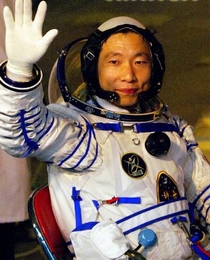
With a Long March-II-F carrier rocket pushing Shenzhou
V?into the orbit some 300 kilometers away from the Earth
Wednesday morning, Yang Liwei, 38, turns out to be China's first
astronaut in space.
At 9 a.m. Wednesday (Beijing time), Yang, aboard Shenzhou
V?white in color, took off from the Jiuquan Satellite Launch
Center on the Gobi desert in northwest China's Gansu Province.
He is expected to land somewhere on central Inner Mongolia
grassland at 7 a.m. Thursday, after orbiting the earth 14 times.
Yang will be traveling some 500,000 kilometers in space in 21
hours, a "traveler's record" in the world's most populous nation
with a 5,000-year-old civilization.
When Shenzhou-5 entered orbit on schedule, the ground command
center received a message sent by Yang from outer space, saying
that "everything goes smoothly". His name, however, had remained
unknown until 5 a.m. Wednesday,
At 5 a.m. sharp Wednesday, Yang was seen waving his hands to a
group of journalists from inside a glass-shielded room at the
Jiuquan launch center, with two other astronauts sitting beside him
as "backups".
Yang, who looked calm, found himself in a shower of camera
flashlights. He responded with a broad smile.
In an exclusive interview with Xinhua, Yang expressed full
confidence in China's first manned space flight
Su Shuangning, director-general and chief designer of the
astronaut system under China's manned space program, described Yang
as a sober-minded person with a "superb capability of
self-control".
While a fighter pilot, Yang had 1,350 hours of flight
experience. He was chosen, along with 13 others, from among 1,500
pilots for space flight training.
Yang's colleagues described him as a man with a good team
spirit, a man of dedication to his career. Friends at his hometown,
Suizhong County of northeast China's Liaoning Province, remember
that Yang had dreamed of flying when still a child.
Yang was recruited by the No. 2 Aviation College of the PLA Air
Force in September 1983 and became a fighter pilot after graduation
with bachelor's degree. In 1998, Yang became a member of China's
first team of astronauts.
Yang, 168 cm tall, is a lieutenant colonel. He has an
eight-year-old son, and his wife, Zhang Yumei, also serves in
China's space program.
According to Su Shuangning, China's first team of astronauts are
all capable of working and living in space thanks to five years of
rigid physical, psychological and technical training. He said that
Yang Liwei was one of the best in the team.
In an Astronaut Training Base in Beijing, China's would-be
astronauts had lessons necessary for space flight, including
aviation dynamics, air dynamics, geophysics, meteorology,
astronomy, space navigation, design principle and structure of
rockets and spacecraft, as well as equipment examination. Moreover,
they received systematic training in space flight in
simulators.
"To establish myself as a qualified astronaut, I have studied
harder than in my college years and have received training much
tougher than for a fighter pilot," said Yang.
If the spaceship's re-entry module could not land at the pre-set
areas and the recovery team could not rush to the spot on time, the
astronaut must act for self-rescue. "Therefore, survival skills
have become one of the most important knowledge for the astronauts
to grasp", said Su Shuangning. "Through rigorous training, our
astronauts have learned how to survive under extreme
conditions."
Twenty-five days before the launch of Shenzhou-5, the would-be
astronauts started exercising in the real spacecraft at the Jiuquan
Launch Center.
"When I boarded the spacecraft for the first time, I couldn't
help feeling excited," Yang recalled. "I decided that I must fly
it."
At 6:15 a.m. Wednesday, Yang got seated in the re-entry module
of Shenzhou-5, atop a 58.3-meter-high Long March-II-F carrier
rocket. Between 1999 and 2002, Long March-II-F carrier rockets were
used to launch four unmanned spacecraft into orbit, and all the
launches were successful
(Xinhua News Agency October 15, 2003)

